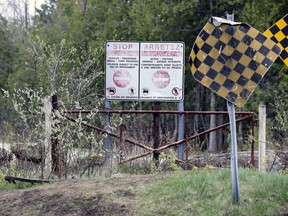Canadian refugee advocates have long battled the asylum agreement, contending the U.S. is not always a safe country for people fleeing persecution.
Author of the article:

La Presse Canadienne
Émilie Bergeron

The Supreme Court of Canada on Thursday examined the Safe Third Country Agreement between Canada and the United States. The agreement is at heart of the irregular arrival in this country by migrants using unofficial points of entry — most notably Roxham Rd. in the Montérégie.
The high court heard arguments about the constitutionality of the agreement, under which Canada and the United States recognize each other as havens to seek protection.
Sign up to receive daily headline news from the Montreal Gazette, a division of Postmedia Network Inc.
Thanks for signing up!
A welcome email is on its way. If you don't see it, please check your junk folder.
The next issue of Montreal Gazette Headline News will soon be in your inbox.
The pact allows Canada to turn back refugees who show up at land ports of entry along the Canada-U.S. border on the basis they must pursue their claims in the U.S., the country where they first arrived.
The Canadian government argues in its own brief to the court that returnees have access to fair asylum and detention processes south of the border. “It is not unreasonable to remove claimants to the United States so that they can claim protection in that country.”
The Roxham Rd. access point allows would-be migrants to sidestep an official border crossing and then have their case heard by immigration authorities.
Canadian refugee advocates have long battled the asylum agreement, contending the U.S. is not always a safe country for people fleeing persecution.
Several refugee claimants took the case to Federal Court along with the Canadian Council for Refugees, the Canadian Council of Churches and Amnesty International, who participated in the proceedings as public-interest parties.
In each case, the applicants, who are citizens of El Salvador, Ethiopia and Syria, arrived at an official Canadian entry point from the U.S. and sought refugee protection.
Their lawyers have argued that the Safe Third Country Agreement violates Article 7 of the Canadian Charter of Rights and Freedoms, which guarantees “the right to life, liberty and security of the person.”
On Thursday, one of those lawyers, Andrew J. Brouwer, told the court that the risk of imprisonment was in itself sufficient to find the agreement unconstitutional. When the judges asked whether incarceration was “automatic,” Brouwer said: “We’re saying that it is detention by default,” adding that whether the detention was automatic was not pertinent to whether Article 7 had been violated.
The issue of irregular entry into Canada made headlines most recently when Radio-Canada reported that the federal government had spent nearly $500 million to cover the costs of processing and sheltering those who entered the country via Roxham Rd.
The country’s highest court is expected to hear from lawyers from the federal Justice Department representing the federal Immigration Ministry.
Opposition parties in the House of Commons have long called for the agreement to be suspended while the Trudeau government has argued the agreement should be updated and negotiations are ongoing with the U.S.
“Obviously we have concerns (about the agreement),” Trudeau said Thursday morning while on his way to a cabinet meeting. “We will always ensure that our principles and our values when it comes to immigration and the rights of the person are respected.”
Trudeau said Ottawa relies on the United Nations High Commission for refugees to ensure that the rights of rejected migrants are respected.
-

Nicolas: Quebec's position on asylum seekers is pure folly
-

Legault calls on Ottawa to close Roxham Rd.
-

Quebec already has 'the tools in hand' to choose immigrants: federal minister


